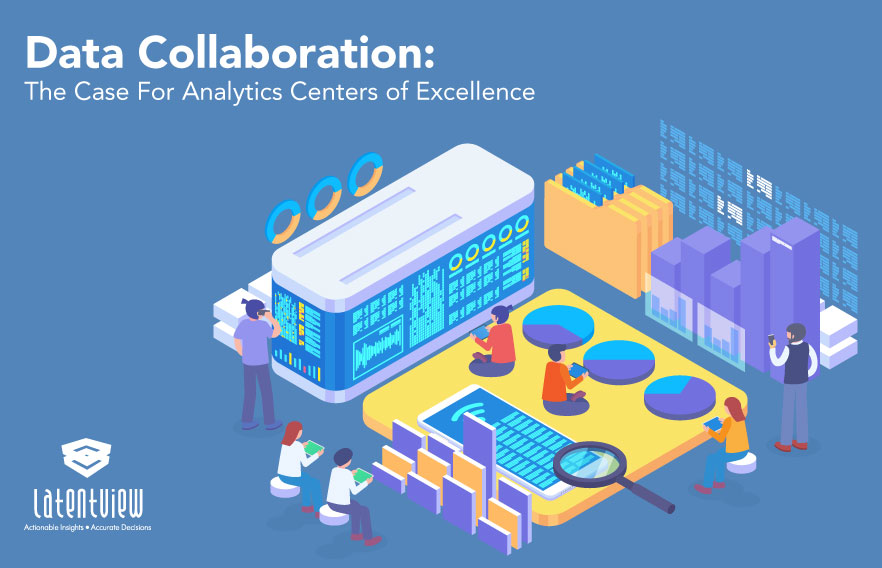We create over 2.5 quintillion bytes of data every day. By 2020, it is expected that the digital universe will reach 44 zettabytes. For context, that’s 40x more bytes than there are stars in the observable universe.
Awash in oceans of information, enterprises are struggling in two areas:
1) Ensuring that all their employees have some baseline familiarity with data.
2) Preventing stratification of data and expertise, and the data and organizational silos that result
In our data-rich world, Analytics Centers of Excellence (CoEs) for big data collaboration are an important construct that enterprises can use to meet these challenges. They break organizational silos by increasing data literacy and facilitating collaboration across disciplines — ultimately driving business value.
What Are Analytics Centers of Excellence?
Broadly, CoEs of all types are designed to bring together employees from disparate disciplines and provide them with shared resources and facilities. CoEs allow organizations to assemble a wide range of expertise for interdisciplinary collaboration. They also provide training, best practices, resources and opportunities for big data collaboration to create a feedback loop of competency.
Analytics CoEs are a distinct subset of CoEs, and their importance has never been more pronounced. In their first iteration, they were designed to establish and support analytics activities across the enterprise, but, with the data revolution, Analytics CoEs have expanded in scope and importance.
Here’s what an Analytics Centre of Excellence framework:
Analytic Supply and Demand: Bridging the Gap
It’s no secret that there is a shortage of qualified data scientists. According to a 2019 report by Indeed, job postings for data scientists have jumped 29% since 2018. By contrast, the uptick in job searches for data scientists only increased by 14%. While both are growing, the fact that job postings almost doubled the growth of job searches indicates demand for data scientists is greatly outpacing the supply. There are simply too few data scientists available, and they are needed now more than ever, especially with the rise of AI/ML applications.
Analytics CoEs help bridge the gap by creating what Gartner terms “citizen data scientists,” whose primary responsibilities fall outside the scope of analytics or data science, but still have enough basic-to-intermediate skills to solve many of their own analytics needs. Whereas the focus was once on analytics experts, these days CoEs are for everyone.
The Analytics Centre of Excellence framework provides training and resources for non-analytics employees to develop their baseline competencies. These are not intended to replace analytics experts, rather, they help soothe the “data ache” of having too few and ease the strain on the already limited data science resources.
Furthermore, Analytics CoEs can be outsourced when companies have limited internal analytics capabilities. According to a recent McKinsey survey, fewer than 20% of companies have maximized potential and achieved advanced analytics at scale. The remaining 80% of companies need outsourced Analytics CoEs to help them achieve similar results. Experts note that CoEs can be evangelists of the power of analytics, pushing the organization in a new, more strategic business direction.
Destination Collaboration
In today’s market, isolated disciplines (and data) are a recipe for disaster. If the sales team is not coordinating with the marketing team, for instance, they are missing out on crucial information that could help convert prospects and cross sell to existing clients. This need is increasingly driving teams to be more collaborative across disciplines.
Analytics Centers of Excellence aid this process of big data collaboration by providing a space for teams across disciplines to converge and share their distinct knowledge, data, and insights. If a team can touch the core area of a project in multiple ways, the project has a richer, fuller perspective of the problems and approaches at hand.
Analytics Centers of Excellence also provide much-needed consistency in terms of resources. They provide shared tools such as calendars and work standards to enable the collaboration process be that much more seamless. They also get teams outside of their department-specific metrics, pushing the entire organization to leverage data that is focused on the bigger picture.
Driving Business Success: Where to Start
The data revolution requires organizational change. Analytics Centers of Excellence are excellent constructs to develop data collection and cohesion, diverse skills across teams, and a solid network of data savvy people across the entire enterprise.
Implementation must be thought out strategically and should be customized according to each organization’s needs, but it starts with buy-in and sponsorship from the top (CFO, COO, Chief Data Officer, Chief Analytics Officer, etc).
Some key considerations when thinking about creating or outsourcing an Analytics center of expertise:
- Assess your current analytics culture and maturity
- Create an analytics strategy by aligning the CoE mission with your business priorities
- Identify a core team of experts around which to build
- Develop and customize shared processes and infrastructure to sync the CoE with your organization (data governance programs, shared Slack channels, calendars, etc.)
Ultimately, Analytics CoEs enable more data-driven decision making in all areas and help infuse analytics into every department. This will help drive your entire organization into the digital era with eyes wide open, keeping you profitable in the data-filled future.
Has your enterprise developed an Analytics CoE? I would love to hear about your successes and challenges.



